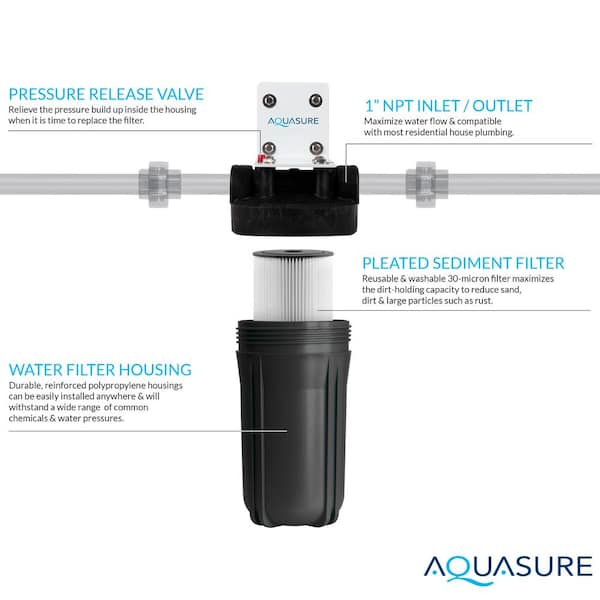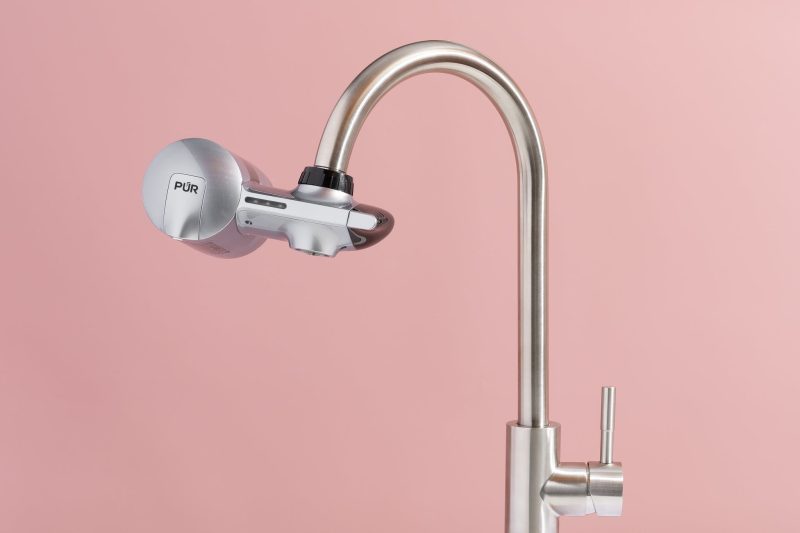This post contains affiliate links. As an Amazon Associate, we earn from qualifying purchases.
Carbon water filters should be replaced every six months. Regular replacement ensures that the filters are effective in removing contaminants from water.
Water filters are essential in ensuring that the water we drink is free from impurities and contaminants. Carbon water filters are particularly effective in removing chlorine, sediment, and volatile organic compounds. While these filters are efficient, they need replacement every six months to function correctly.
Failure to replace carbon water filters within the recommended period may result in reduced performance, which can lead to recontamination of the water. Regular replacement of these filters, however, guarantees that they remain effective in removing contaminants from the water. This article delves into the frequency of replacing carbon water filters and the factors to consider when doing so.

Credit: www.homedepot.com
Understanding Carbon Water Filters
What Is A Carbon Water Filter?
Carbon water filters are a type of water filtration system that uses activated carbon to filter out impurities from the water. The carbon is treated with oxygen to open up millions of tiny pores between the carbon atoms, creating a large surface area for adsorption.
The carbon filters can remove chlorine, sediment, volatile organic compounds (vocs), and other chemicals from the water.
Types Of Carbon Water Filters
There are two types of carbon water filters:
- Granular activated carbon (gac) filters: These filters consist of loose carbon granules held in a cartridge. They are ideal for removing larger particles and chemicals in the water.
- Carbon block filters: These filters use compressed carbon to filter the water. They remove smaller particles and impurities and have a longer lifespan than gac filters.
How Do Carbon Water Filters Work?
Carbon water filters use the process of adsorption to remove impurities from the water. Adsorption is the process of attracting and attaching the impurities to the surface of the activated carbon. When the water passes through the carbon filter, the impurities are trapped in the tiny pores and removed from the water.
Here’s how the process works:
- Water first enters the filter through an inlet valve.
- The water passes through the carbon filter, where the activated carbon attracts and removes impurities from the water.
- The treated water then exits the filter through an outlet valve and is ready for use.
To maintain the efficiency of the carbon water filter and ensure safe drinking water, it is recommended to change the filter every six months or as per the manufacturer’s instructions.
Understanding carbon water filters is essential to ensure that your drinking water is clean and safe for consumption. Regular replacement of the filters is critical to maintain their effectiveness and ensure the removal of impurities from the water.
Importance Of Changing Carbon Water Filters Regularly
How Often Should You Change Your Carbon Filter?
Carbon water filters are essential for ensuring that the water you drink is free from impurities and contaminants. However, like any other filter, carbon water filters become dirty over time and need to be replaced. The question is, how often should you replace your carbon filter?
Here are some key points to consider:
- Carbon filters should ideally be replaced every 6-12 months, depending on usage and water quality.
- If you notice a decrease in water pressure or a change in the taste or odor of your water, it is a sign that your filter needs to be replaced.
- If you have a busy household or use a lot of water, you may need to replace your filter more frequently.
Effects Of Not Changing Carbon Filters Regularly
Not changing your carbon filter on a regular basis can have several negative effects on your water and your health. Here are some key points to consider:
- Your water may taste and smell unpleasant due to the accumulation of impurities and contaminants.
- Your filter may become clogged, leading to a decrease in water pressure.
- Harmful bacteria may grow in your filter, which can make you sick.
- In the long term, exposure to contaminated water can lead to health problems such as diarrhea, vomiting, and stomach cramps.
Reasons Why Changing Carbon Water Filters Can Improve Water Quality
Regularly changing your carbon water filters can significantly improve the quality of your water. Here are some reasons why:
- Carbon filters remove impurities and contaminants, such as chlorine, sediment, and bacteria, from your water.
- Changing your filter regularly ensures that your water remains clean and free from harmful pollutants.
- Clean water tastes better and is more refreshing to drink, which encourages you to drink more water and stay hydrated.
- By regularly changing your filter, you are investing in your health and well-being, ensuring that you and your family stay healthy and free from waterborne illnesses.
Remember, regular maintenance is key to getting the most out of your carbon water filter. By following the recommended guidelines, you can ensure that your water remains clean, fresh, and healthy.
Factors To Consider When Changing Carbon Water Filters
With the increasing pollution levels in the environment, it’s essential to install a reliable carbon water filter to purify your drinking water. However, to ensure your filter runs effectively, you need to replace it periodically. Here are some crucial factors to consider when changing carbon water filters.
Water Demand And Filter Size
The size of your carbon water filter depends on your household’s water demand. Therefore, it’s crucial to choose the right filter size to meet your needs and avoid frequent filter changes that can increase your expenses.
Water Quality And Contaminant Levels
The quality of your water supply influences how often you should change your carbon water filters. If your water supply contains high levels of sediments and other impurities, your filters may clog more often, which requires regular replacements. Furthermore, the filter’s lifespan will depend on the level of contaminants that need to be removed.
Frequency Of Filter Use
How often you need to replace your carbon water filter depends on the frequency of use. If you use your filter frequently, you must change it more often to ensure it functions effectively. Conversely, if you use it rarely, you can prolong the filter’s lifespan.
Initial Water Quality
The initial quality of your tap water also plays a vital role in determining how often to change your carbon water filter. If your water contains high levels of pollutants, the sediment and impurities can quickly clog the filter, requiring more frequent replacements.
Changing carbon water filters is vital in ensuring the quality of your drinking water. The frequency of filter change relies on numerous factors, including filter size, water quality, and contaminant levels, frequency of filter use, and initial water quality. Make sure you change your filter regularly to safeguard the purity of your water, as well as your health and that of your loved ones.
Signs That Indicate It Is Time To Change Your Carbon Filter
Carbon water filters are an excellent way to ensure safe, clean, and healthy water. They work by trapping contaminants, such as chlorine, pesticides, and sediments, while also improving the taste and odor of the water. However, carbon filters are not meant to last a lifetime.
They will eventually require replacement, and knowing when to change them can be essential to maintain the quality of your water.
Decreased Water Flow
As time goes by, carbon filters will get clogged with pollutants and debris, leading to decreased water flow. You may notice a lower water pressure coming from the tap or showerhead. If this happens, it’s time to change your carbon filter.
- Decreased water flow is a clear sign that the filter is no longer effective and needs replacing.
Strange Odors Or Taste In Water
Carbon filters are designed to remove unpleasant odors and taste from water. If you start to notice strange odors or taste in your water, it’s possible that your filter is no longer functioning as it should be.
- Strange odors or taste in water indicate that the contaminant levels are too high for the carbon filter to handle.
Cloudy Or Discolored Water
Cloudy or discolored water is another sign that your carbon filter is not working correctly. If your water looks cloudy or has a brownish or rusty color, it’s time to replace your carbon filter.
- Cloudy or discolored water is a significant indication that there are rust particles and sediment that the carbon filter is no longer able to remove.
Increased Contaminant Levels
Carbon filters are meant to trap pollutants and contaminants, such as lead, mercury, and pesticides. If these contaminants start to seep through the filter, the water quality will be compromised.
- Increased levels of contaminants in water indicate that the carbon filter is no longer effective.
Remember, regularly changing your carbon filter will ensure that your family is drinking safe and clean water. Don’t wait until is too late; monitor the signs and change your filter frequently.
Diy Guide To Changing Your Carbon Water Filter
Carbon water filters are an essential part of maintaining high-quality water in your home. Over time, your carbon filter will become less effective, so it’s important to know when to change it. In this diy guide, we’ll walk you through the steps of changing your carbon water filter.
Turn Off Water Supply And Isolate The Filter
Before beginning, turn off the water supply to your home. This step is crucial in preventing any water from flowing to the filter during the replacement process. Once the water supply is turned off, isolate the filter by closing the valves at both the inlet and outlet connections.
Remove And Discard Old Carbon Filter
With the water supply turned off and the filter isolated, it’s time to remove the old carbon filter. Start by using the filter wrench to loosen the filter housing. Once loose, gently twist the filter housing and pull it down.
Remove the old carbon filter, place it in a bag, and discard it properly.
Prepare And Install Replacement Carbon Filter
After removing the old filter, it’s time to prepare the replacement. Firstly, make sure that the replacement filter is of the same size and type as the old one. Then, lubricate the gasket of the new filter with silicone grease and insert it into the filter housing.
Tighten the filter housing using the filter wrench.
Turn On Water Supply And Test The Filter
With the new carbon filter installed, turn on the water supply and wait for the filter housing to fill with water. Check for any leaks or drips from the filter housing connections. Once you’re satisfied that everything is sealed, run the water from the tap and let it flush for a few minutes to remove any air bubbles.
Finally, test the filter by tasting the water to ensure that it’s fresh and pure.
By following these simple steps, you can save time and money by replacing your carbon water filter yourself. Keep in mind that you should change your carbon filter every six months or earlier if it becomes clogged and ineffective. With regular replacement and maintenance, your water filter will continue to provide clean and safe drinking water for you and your family.
Frequently Asked Questions On How Often To Change Carbon Water Filter
How Often Should I Change My Carbon Water Filter?
It is recommended to change your carbon water filter at least every six months. However, if your water has high levels of sediment, chlorine, or other impurities, you may need to change it more frequently. You should also change it if you notice a change in the taste or odor of your water.
How Do I Know When To Change My Carbon Water Filter?
You can tell when it’s time to change your carbon water filter if you notice a reduction in water flow, peculiar taste, or odor. Some filters come with a time indicator that signals when it’s time to replace them. If there’s no indicator, use a calendar to note the filter’s installation date and keep track of when to switch it.
Can I Clean My Carbon Water Filter Instead?
No, you cannot clean a carbon water filter. Carbon filters can only be replaced, not cleaned. Over time, the carbon filter will become saturated and will no longer be effective at filtering water. Cleaning will not remove all contaminants, and it will not improve the filter’s effectiveness.
What Happens If I Don’T Change My Carbon Water Filter?
If you don’t change your carbon water filter, it will start to lose its effectiveness at removing contaminants from your water. This can lead to low water pressure, bad taste and odor, and potential health risks from impurities in your water.
Models with built-in indicators knowable once to replace.
How Do I Replace My Carbon Water Filter?
First, turn off your water supply, then remove the filter housing unit and dispose of the old filter. Clean the housing unit thoroughly and insert the new carbon water filter. Make sure everything is tight and secure, then turn the water supply back on and run water through the filter to eliminate any air pockets.
Conclusion
Replacing your carbon water filter is crucial for maintaining a healthy, pure water source. The frequency of filter changes depends on your usage and the quality of water in your area. It is recommended to change the filter every six months to ensure maximum efficiency.
Ignoring an expired filter can lead to a buildup of bacteria and harmful contaminants, reducing the effectiveness of your water filtration system. By regularly changing your carbon water filter, you can enjoy great-tasting, clean water free from impurities. Don’t compromise on something as important as your health and well-being – prioritize the routine maintenance of your water filtration system.
With a little attention and care, you can enjoy crystal clear, refreshing water for years to come.


